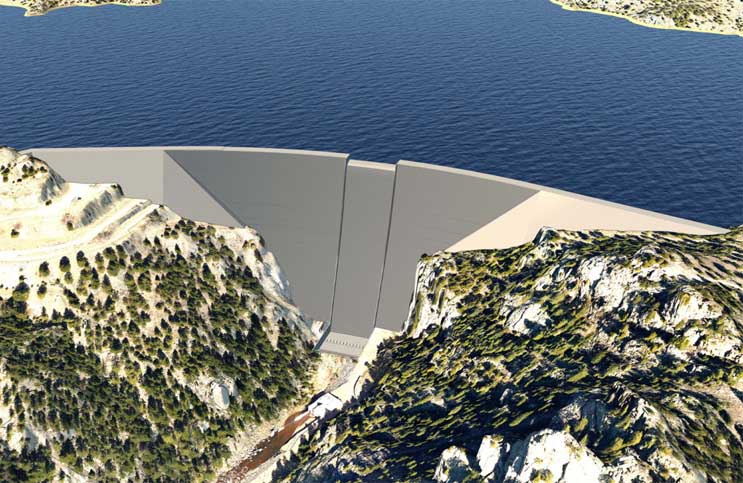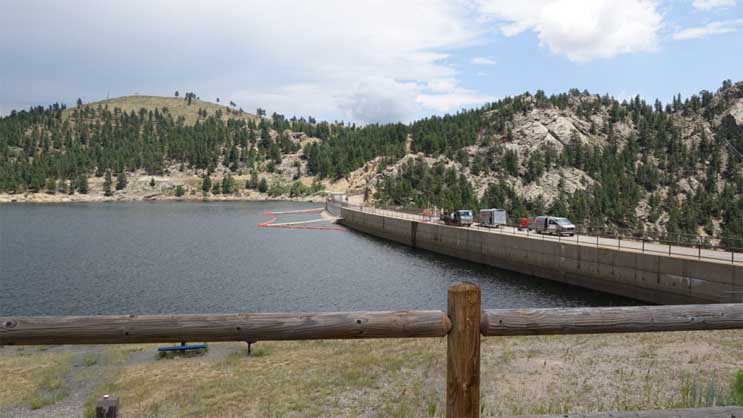FERC Gives Final Federal Nod Of Approval For Gross Reservoir Expansion
By Jay Adams, Denver Water
Project to raise dam will improve water reliability for more than 1.5 million people while benefiting the environment.
A plan to expand Gross Reservoir in Boulder County cleared its final federal hurdle on July 16, 2020, when the Federal Energy Regulatory Commission gave its approval for the project and ordered Denver Water to proceed with design and construction.
The $464 million (in 2025 dollars) expansion involves raising Gross Dam by 131 feet to nearly triple the size of the reservoir behind it.
“This is a major milestone that comes after nearly 17 years of careful study, public involvement, planning, and state and federal permitting,” said Jim Lochhead, CEO/Manager of Denver Water. “This federal order to expand Gross Reservoir is critical to our ability to ensure a reliable supply of water to our customers in the future, while providing a net environmental benefit for the state.”
Gross Dam was built in the 1950s and named after Dwight D. Gross, a former chief engineer at Denver Water. It was built to store water from the West Slope that travels through the Moffat Tunnel, as well as water from South Boulder Creek.
“The original engineers designed the dam so that it could be raised twice, if needed,” said Jeff Martin, Gross Reservoir project manager. “Based on our water supply projections and current system shortfalls, that need is here.”
Denver Water began the permitting process to raise the dam in 2003 and received approvals from the Colorado Department of Public Health and Environment in 2016 and the U.S. Army Corps of Engineers in 2017.
The project has earned support from major environmental groups, business interests, water users on both sides of the Continental Divide and elected officials on both sides of the aisle, including the state’s last five Governors.
Raising the dam will increase the reservoir’s storage capacity by 77,000 acre-feet of water and make Gross Reservoir the second-largest in Denver Water’s system. When complete, Gross Reservoir will be able to hold 119,000 acre-feet, second only to Dillon Reservoir in Summit County, which is capable of holding just north of 257,000 acre-feet.

Expanding the reservoir requires raising the dam 131 feet by placing new concrete on the existing structure. (Image credit: Denver Water)
Expanding Gross Reservoir is a major part of Denver Water’s long-term, multipronged approach to deliver safe, reliable water to more than 1.5 million people today and those who will call the Front Range home in the future. That approach includes increased water efficiency, recycling water, and responsibly sourcing new storage.
The additional reservoir capacity will enable increased water capture in wet years to help avoid shortages during droughts. It will also help offset a current imbalance in Denver Water’s collection system that is a significant risk.
“Right now, 90 percent of our water storage is on the south end of our water collection system, but just 10 percent of our storage is on the north end,” Martin said. “By enlarging Gross Dam, we’ll be able to store more water in the north, which will improve our flexibility in the event there’s a problem on the south side that could come from any number of operational issues or threats, like wildfires.”
Once filled, the expansion at Gross will provide an additional 72,000 acre-feet of water storage, which is roughly the amount 288,000 residential households would use for one year.
In addition, 5,000 acre-feet of storage space in the expanded reservoir — known as the environmental pool — is reserved to support environmental needs as part of an agreement with the cities of Boulder and Lafayette. Water from the environmental pool will be used to provide beneficial stream flows along a 17-mile stretch of South Boulder Creek below the dam during dry periods to protect fish and aquatic insects.
Denver Water also has committed over $20 million to more than 60 environmental mitigation and enhancement projects on both sides of the Continental Divide as a result of the project. According to Colorado officials, those commitments will provide a net environmental benefit for the state’s water quality.

Preliminary work for the project underway at the dam. (Photo credit: Denver Water)
Preconstruction activities, including dam design and geotechnical work, have been underway.
Denver Water will use its existing water rights to fill the reservoir when it is complete. Engineers expect it will take around five years to fill the newly expanded portion of the reservoir, depending on precipitation and water use from customers.
Lochhead said Denver Water will continue working closely with communities impacted by construction to ensure safety while minimizing public inconveniences like traffic, dust, and noise.
“In the end, this project won’t be judged by whether we raised the dam, but rather how we went about expanding the reservoir,” Lochhead said. “We will continue to seek community input and look forward to further conversations with Boulder County about local permits and the county’s participation in the development of various construction plans per the FERC order.”
Additional information about construction, recreation, environmental benefits, community impacts, and frequently asked questions are available at grossreservoir.org.
